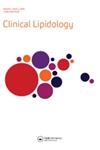治疗性抑制apoC-III治疗高甘油三酯血症
Q Medicine
引用次数: 9
摘要
高甘油三酯血症是许多代谢性疾病的共同特征,已被确定为心血管疾病的危险因素。ApoC-III通常与富含甘油三酯的脂蛋白有关,并已被确定为血浆TG水平的有效调节剂。本综述的目的是提供apoC-III的背景及其在调节血浆TG和脂蛋白代谢中的作用,并强调支持apoC-III作为心血管疾病进展的中心靶点的临床前和遗传证据。最后,总结了第二代apoC-III反义寡核苷酸(ASO)抑制剂的近期临床试验结果,并强调了该药物在治疗高甘油三酯血症及相关合并症中的潜在影响。本文章由计算机程序翻译,如有差异,请以英文原文为准。
Therapeutic inhibition of apoC-III for the treatment of hypertriglyceridemia
Abstract Hypertriglyceridemia is a common feature of many metabolic disorders and has been identified as risk factor for cardiovascular disease. ApoC-III is commonly associated with triglyceride rich lipoproteins and has been identified as a potent modulator of plasma TG levels. The purpose of this review is to provide background on apoC-III and its role in the regulation of plasma TG and lipoprotein metabolism and to highlight preclinical and genetic evidence supporting apoC-III as a central target in cardiovascular disease progression. Finally, recent results from clinical trials evaluating a second generation antisense oligonucleotide (ASO) inhibitor of apoC-III will be summarized and the potential impact such a drug could have in the treatment of hypertriglyceridemia and associated comorbidities will be highlighted.
求助全文
通过发布文献求助,成功后即可免费获取论文全文。
去求助
来源期刊

Clinical Lipidology
生物-生化与分子生物学
CiteScore
0.44
自引率
0.00%
发文量
0
审稿时长
6-12 weeks
期刊介绍:
The Journal of Clinical Lipidology is published to support the diverse array of medical professionals who work to reduce the incidence of morbidity and mortality from dyslipidemia and associated disorders of lipid metabolism. The Journal''s readership encompasses a broad cross-section of the medical community, including cardiologists, endocrinologists, and primary care physicians, as well as those involved in the treatment of such disorders as diabetes, hypertension, and obesity. The Journal also addresses allied health professionals who treat the patient base described above, such as pharmacists, nurse practitioners and dietitians. Because the scope of clinical lipidology is broad, the topics addressed by the Journal are equally diverse. Typical articles explore lipidology as it is practiced in the treatment setting, recent developments in pharmacological research, reports of treatment and trials, case studies, the impact of lifestyle modification, and similar academic material of interest to the practitioner. While preference is given to material of immediate practical concern, the science that underpins lipidology is forwarded by expert contributors so that evidence-based approaches to reducing cardiovascular and coronary heart disease can be made immediately available to our readers. Sections of the Journal will address pioneering studies and the clinicians who conduct them, case studies, ethical standards and conduct, professional guidance such as ATP and NCEP, editorial commentary, letters from readers, National Lipid Association (NLA) news and upcoming event information, as well as abstracts from the NLA annual scientific sessions and the scientific forums held by its chapters, when appropriate.
 求助内容:
求助内容: 应助结果提醒方式:
应助结果提醒方式:


